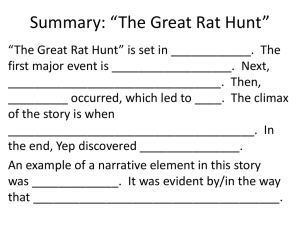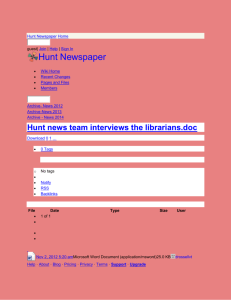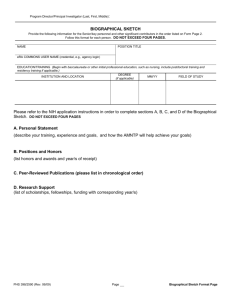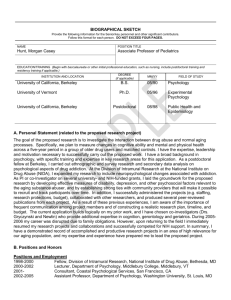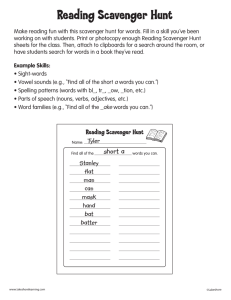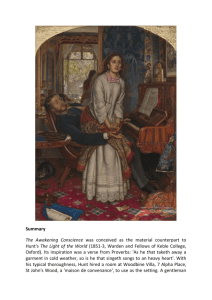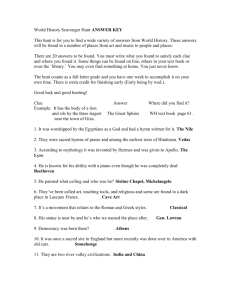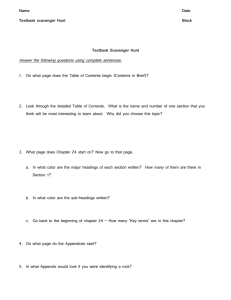PHS 398/2590 (Rev. 06/09), Biographical Sketch Format Page
advertisement
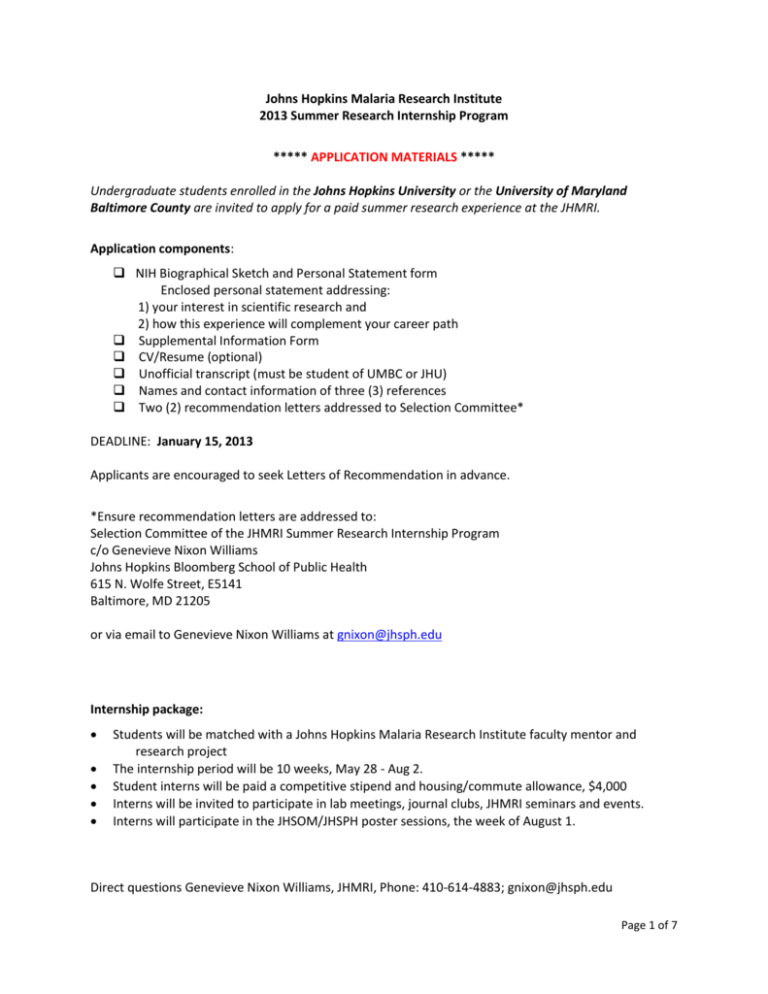
Johns Hopkins Malaria Research Institute 2013 Summer Research Internship Program ***** APPLICATION MATERIALS ***** Undergraduate students enrolled in the Johns Hopkins University or the University of Maryland Baltimore County are invited to apply for a paid summer research experience at the JHMRI. Application components: NIH Biographical Sketch and Personal Statement form Enclosed personal statement addressing: 1) your interest in scientific research and 2) how this experience will complement your career path Supplemental Information Form CV/Resume (optional) Unofficial transcript (must be student of UMBC or JHU) Names and contact information of three (3) references Two (2) recommendation letters addressed to Selection Committee* DEADLINE: January 15, 2013 Applicants are encouraged to seek Letters of Recommendation in advance. *Ensure recommendation letters are addressed to: Selection Committee of the JHMRI Summer Research Internship Program c/o Genevieve Nixon Williams Johns Hopkins Bloomberg School of Public Health 615 N. Wolfe Street, E5141 Baltimore, MD 21205 or via email to Genevieve Nixon Williams at gnixon@jhsph.edu Internship package: Students will be matched with a Johns Hopkins Malaria Research Institute faculty mentor and research project The internship period will be 10 weeks, May 28 - Aug 2. Student interns will be paid a competitive stipend and housing/commute allowance, $4,000 Interns will be invited to participate in lab meetings, journal clubs, JHMRI seminars and events. Interns will participate in the JHSOM/JHSPH poster sessions, the week of August 1. Direct questions Genevieve Nixon Williams, JHMRI, Phone: 410-614-4883; gnixon@jhsph.edu Page 1 of 7 2013 JHMRI SUMMER INTERNSHIP: SUPPLEMENTAL INFORMATION FORM The following questions relate to the Johns Hopkins University’s voluntary efforts to enhance diversity in keeping its education and research missions. They provide important data for assessment of our diversity initiatives and directly assist in matching applicants with additional funding opportunities. I. BASIC INFORMATION *Full name:_______________________________ Preferred name: __________________ *Date of birth (MM/DD/YEAR): _________________ *Will you be continuing your undergraduate studies during the Fall 2013 semester? ___Yes/ ___No *Are you a US citizen or permanent resident (“Green Card” holder)? ___Yes/ ___No II. DEMOGRAPHICS Gender ___Female/ ___Male Please indicate which groups you belong: Ethnic: ___Hispanic/Latino ___Non-Hispanic/Non-Latino Ethnic/racial identifiers: ___ Alaskan Native ___ American Indian ___ Black/African American ___ First or Second generation AfricanAmerican ___ Chinese ___ Filipino ___ Hispanic/Other (including Cuban) ___ Indian/Pakistani ___ Japanese Disabilities: ___ Learning ___ Hearing ___ Ambulatory ___ Korean ___ Mexican American/Chicano ___ Native Hawaiian ___ Other Asian ___ Other Pacific Islander ___ Puerto Rico (Mainland) ___ Puerto Rico (Commonwealth) ___ Southeast Asian (not Vietnamese) ___ Vietnamese ___ White/Caucasian Disadvantaged circumstances: ___ First generation college student ___ Low/moderate family income ___ Sight ___ Speech ___ Other III. FEDERAL RESEARCH SUPPORT List any ongoing research support, especially Institutional NRSA, and the grant completion date. Research grant: ______________________________________ Completion date: ____________ *required Page 1 of 7 Applicant name (Last, First): IV. HOUSING/COMMUTE Organizations such as NIH and FASEB offer funding opportunities for summer housing and transport. Eligibility for funding is based on distance from residence to workplace. Please provide your address, parents’ residence, permanent residences or other summer address. Determine the distance in miles, e.g., Google maps, MapQuest, from your residence(s) to the Johns Hopkins Bloomberg School of Public Health, 615 N. Wolfe Street, Baltimore, MD 21205. *Current address (Distance is greater than 50 miles: ___Yes/ ___No): *Parents’ address and/or permanent address (Distance is greater than 50 miles: ___Yes/ ___No): Other summer address (Distance is greater than 50 miles: ___Yes/ ___No): V. LETTERS OF RECOMMENDATION Please list the name and contact information of the two (2) people supplying your Letters of Recommendation. VI. ACKNOWLEDGEMENT I, ________________________ (full name), I understand that the JHMRI internship program offers a $4,000 stipend and housing/commuting allowance. I also acknowledge that the information I provided above will be used to seek additional support from other funding sources. X____________________________ __________ Applicant signature Date PHS 398/2590 (Rev. 06/09) Page Biographical Sketch Format Page Applicant name (Last, First): BIOGRAPHICAL SKETCH Provide the following information for the Senior/key personnel and other significant contributors in the order listed on Form Page 2. Follow this format for each person. DO NOT EXCEED FOUR PAGES. NAME (Last, First, Middle) POSITION TITLE (Current year in school, e.g., Sophomore) PREFERRED NAME: optional EDUCATION/TRAINING INSTITUTION AND LOCATION e.g., Roosevelt High School, Boston, MA DEGREE (if applicable) MM/YYYY expected graduation date FIELD OF STUDY Major(s) NOTE: The Biographical Sketch may not exceed four pages. Follow the formats and instructions below. A. Personal Statement Briefly describe 1) your interest in scientific research and 2) how this experience will complement your career path. Within this section you may, if you choose, briefly describe factors such as family care responsibilities, illness, disability, and active duty military service that may have affected your scientific advancement or productivity. (700 words maximum) B. Positions and Honors List in chronological order previous positions, concluding with the present position. List any honors and present memberships. C. Publications List any publications. Do not include manuscripts submitted or in preparation. D. Research and Support List both selected ongoing and completed research projects for the past three years (Federal or non-Federallysupported). PHS 398/2590 (Rev. 06/09) Page Biographical Sketch Format Page Applicant (Last, First, Middle): Hunt, Morgan Casey BIOGRAPHICAL SKETCH Provide the following information for the Senior/key personnel and other significant contributors in the order listed on Form Page 2. Follow this format for each person. DO NOT EXCEED FOUR PAGES. NAME POSITION TITLE Hunt, Morgan Casey Associate Professor of Psychology PREFERRED NAME Casey EDUCATION/TRAINING INSTITUTION AND LOCATION DEGREE (if applicable) MM/YY B.S. 05/90 Psychology Ph.D. 05/96 Experimental Psychology Postdoctoral 08/98 Public Health and Epidemiology University of California, Berkeley University of Vermont University of California, Berkeley FIELD OF STUDY A. Personal Statement The goal of the proposed research is to investigate the interaction between drug abuse and normal aging processes. Specifically, we plan to measure changes in cognitive ability and mental and physical health across a five-year period in a group of older drug users and matched controls. I have the expertise, leadership and motivation necessary to successfully carry out the proposed work. I have a broad background in psychology, with specific training and expertise in key research areas for this application. As a postdoctoral fellow at Berkeley, I carried out ethnographic and survey research and secondary data analysis on psychological aspects of drug addiction. At the Division of Intramural Research at the National Institute on Drug Abuse (NIDA), I expanded my research to include neuropsychological changes associated with addiction. As PI or co-Investigator on several university- and NIH-funded grants, I laid the groundwork for the proposed research by developing effective measures of disability, depression, and other psychosocial factors relevant to the aging substance abuser, and by establishing strong ties with community providers that will make it possible to recruit and track participants over time. In addition, I successfully administered the projects (e.g. staffing, research protections, budget), collaborated with other researchers, and produced several peer-reviewed publications from each project. As a result of these previous experiences, I am aware of the importance of frequent communication among project members and of constructing a realistic research plan, timeline, and budget. The current application builds logically on my prior work, and I have chosen co-investigators (Drs. Gryczynski and Newlin) who provide additional expertise in cognition, gerontology and geriatrics. During 20052006 my career was disrupted due to family obligations. However, upon returning to the field I immediately resumed my research projects and collaborations and successfully competed for NIH support. In summary, I have a demonstrated record of accomplished and productive research projects in an area of high relevance for our aging population, and my expertise and experience have prepared me to lead the proposed project. B. Positions and Honors Positions and Employment 1998-2000 Fellow, Division of Intramural Research, National Institute of Drug Abuse, Bethesda, MD 2000-2002 Lecturer, Department of Psychology, Middlebury College, Middlebury, VT 2001Consultant, Coastal Psychological Services, San Francisco, CA 2002-2005 Assistant Professor, Department of Psychology, Washington University, St. Louis, MO PHS 398/2590 (Rev. 06/09) Page Biographical Sketch Format Page Applicant (Last, First, Middle): 2007- Hunt, Morgan Casey Associate Professor, Department of Psychology, Washington University, St. Louis, MO Other Experience and Professional Memberships 1995Member, American Psychological Association 1998Member, Gerontological Society of America 1998Member, American Geriatrics Society 2000Associate Editor, Psychology and Aging 2003Board of Advisors, Senior Services of Eastern Missouri 2003-05 NIH Peer Review Committee: Psychobiology of Aging, ad hoc reviewer 2007-11 NIH Risk, Adult Addictions Study Section, member Honors 2003 2004 2009 Outstanding Young Faculty Award, Washington University, St. Louis, MO Excellence in Teaching, Washington University, St. Louis, MO Award for Best in Interdisciplinary Ethnography, International Ethnographic Society C. Selected Peer-reviewed Publications (Selected from 42 peer-reviewed publications) Most relevant to the current application 1. Merryle, R.J. & Hunt, M.C. (2004). Independent living, physical disability and substance abuse among the elderly. Psychology and Aging, 23(4), 10-22. 2. Hunt, M.C., Jensen, J.L. & Crenshaw, W. (2007). Substance abuse and mental health among communitydwelling elderly. International Journal of Geriatric Psychiatry, 24(9), 1124-1135. 3. Hunt, M.C., Wiechelt, S.A. & Merryle, R. (2008). Predicting the substance-abuse treatment needs of an aging population. American Journal of Public Health, 45(2), 236-245. PMCID: PMC9162292 4. Hunt, M.C., Newlin, D.B. & Fishbein, D. (2009). Brain imaging in methamphetamine abusers across the life-span. Gerontology, 46(3), 122-145. 5. Hunt, M.C. & Sher, K.A. (2009). Successful intervention models for older drug-abusers: Research across the life-span. American Psychologist, in press. NIHMSID: NIHMS99135 Additional recent publications of importance to the field (in chronological order) 1. Gryczynski, J., Shaft, B.M., Merryle, R., & Hunt, M.C. (2002). Community based participatory research with late-life addicts. American Journal of Alcohol and Drug Abuse, 15(3), 222-238. 2. Shaft, B.M., Hunt, M.C., Merryle, R., & Venturi, R. (2003). Policy implications of genetic transmission of alcohol and drug abuse in female nonusers. International Journal of Drug Policy, 30(5), 46-58. 3. Hunt, M.C., Marks, A.E., Shaft, B.M., Merryle, R., & Jensen, J.L. (2004). Early-life family and community characteristics and late-life substance abuse. Journal of Applied Gerontology, 28(2),26-37. 4. Hunt, M.C., Merryle, R. & Jensen, J.L. (2005). The effect of social support networks on morbidity among elderly substance abusers. Journal of the American Geriatrics Society, 57(4), 15-23. 5. Hunt, M.C., Pour, B., Marks, A.E., Merryle, R. & Jensen, J.L. (2005). Aging out of methadone treatment. American Journal of Alcohol and Drug Abuse, 15(6), 134-149. 6. Hunt, M.C., Marks, A.E., Venturi, R., Crenshaw, W. & Ratonian, A. (2007). Community-based intervention strategies for reducing alcohol and drug abuse in the elderly. Addiction, 104(9), 1436-1606. PMCID: PMC9000292 7. Merryle, R. & Hunt, M.C. (2007). Randomized clinical trial of cotinine in older nicotine addicts. Age and Ageing, 38(2), 9-23. PMCID: PMC9002364 8. Hunt, M.C., Jensen, J.L. & Merryle, R. (2008). The aging addict: ethnographic profiles of the elderly drug user. NY, NY: W. W. Norton & Company. 9. Hunt, M.C. (2009). Contrasting ethnicity with race in the older alcoholic. The Journals of Gerontology Series B: Psychological Sciences and Social Sciences, in press. PMCID: PMC Journal – In Process. 10. Hunt, M.C. (2009). Intervening successfully with the older methadone patient. Journal of Applied Gerontology, 13(4), 67-79. PHS 398/2590 (Rev. 06/09) Page Biographical Sketch Format Page Applicant (Last, First, Middle): Hunt, Morgan Casey D. Research Support Ongoing Research Support R01 DA942367-03 Hunt (PI) 09/01/08-08/31/13 Health trajectories and behavioral interventions among older substance abusers The goal of this study is to compare the effects of two substance abuse interventions on health outcomes in an urban population of older opiate addicts. Role: PI R01 MH922731-05 Merryle (PI) 12/15/07-11/30/12 Physical disability, depression and substance abuse in the elderly The goal of this study is to identify disability and depression trajectories and demographic factors associated with substance abuse in an independently-living elderly population. Role: Co-Investigator Faculty Resources Grant, Washington University 08/15/09-08/14/11 Opiate Addiction Database The goal of this project is to create an integrated database of demographic, social and biomedical information for homeless opiate abusers in two urban Missouri locations, using a number of state and local data sources. Completed Research Support K02 AG442898 Hunt (PI) 02/01/02-01/31/05 Drug Abuse in the Elderly Independent Scientist Award: to develop a drug addiction research program with a focus on substance abuse among the elderly. Role: PI R21 AA998075 Hunt (PI) 01/01/02-12/31/04 Community-based intervention for alcohol abuse The goal of this project was to assess a community-based strategy for reducing alcohol abuse among older individuals. Role: PI PHS 398/2590 (Rev. 06/09) Page Biographical Sketch Format Page
